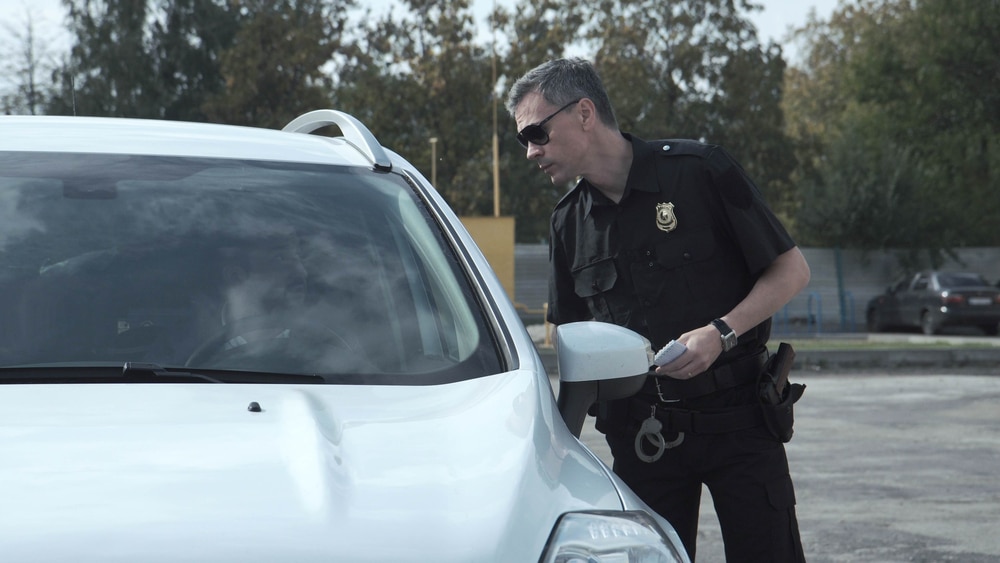When a police officer begins to pull you over, what you do and say can have a huge effect on any legal proceedings that might follow. Whether the traffic stop ends in a simple moving violation or an arrest for a more serious crime, your choices are critical.
What To Do When Pulled Over
Acknowledge the officer by turning on flashers.
To let the officer know that you’ve seen his lights and that you plan on pulling over, turn on your emergency flashers. We recommend you do this if you think you’ll need to drive a distance before you can find a safe place to pull over.
Pull over to a safe area.
Typically, you want to pull over to the right side of the road. When looking for a spot to pull over to, think “safety first” for both you and the officer. We recommend looking for an area with a wide shoulder so passing traffic isn’t a hazard. If it’s nighttime, look for a nearby place that’s well lit if at all possible. That will help put the officer at ease. Parking lots and well-lit side streets are other safe places to pull over to.
Turn off engine, roll down window, and turn on your dome lights.
As soon as you come to a stop, turn off your engine and roll down your window. If it’s dark out, turn on your dome light so the officer can see what’s going on inside the vehicle as he approaches.
Stay calm, and stay in the car.
It’s common to get amped up whenever you get pulled over. Take some deep breaths and relax. Unless you’ve done something outright criminal (such as driving intoxicated, possessing illegal drugs, etc.), then there’s nothing to be nervous about. Regardless, you’ll want to keep your hands on the steering wheel and remain still as the officer approaches your vehicle.
Wait for the officer to ask for your documents.
Don’t try to expedite the process by getting your license and registration ready while the officer approaches your car. For all they know you could be reaching for a gun or trying to hide some sort of incriminating evidence. Wait until he or she gets to the window and asks for your documents.
If you’re carrying a gun, let the officer know.
Some states have laws that require concealed carry owners to inform officers that they’re carrying a gun anytime they get pulled over. Louisiana is called a “must inform” state, and requires that you tell the officer that you have a gun in the vehicle or on your person if they are approaching you.
Be civil.
Be polite and respectful in your communications with the officer. Yes, it sucks to get a ticket, but calling the officer names, threatening him, and being rude won’t get you anywhere. In fact, it could make things worse. If the officer happens to be a woman, refer to her as “officer” or “ma’am,” not “sweetheart” or “honey.” She’s an officer of the law, show some respect.
Don’t consent to a search.
In order to search your vehicle without your consent, an officer needs probable cause – maybe he smells something in the car or sees a bottle on your seat. If he doesn’t have probable cause but wants to search your car anyway, he’ll need your consent and may ask you something like, “You don’t mind me taking a look in your car, do you?” Even if you haven’t done anything illegal, it’s usually a good idea to exercise your Fourth Amendment right in this situation and decline the search.
Don’t argue, and sign the citation.
If the officer decides to issue a citation, he’ll ask you to sign it. Sign it. It’s not an admission of guilt, it’s just recognition that you’ve received the citation and that you promise to either 1) pay the fine or 2) show up to court on the designated date. “A signature on a citation in most jurisdictions is in lieu of you posting a cash bond. Posting a cash bond generally consists of a trip to the nearest jail or judge and may include a booking process and fingerprinting.
Call Greenwald Law Firm.
After you’ve been pulled over, make sure to collect all the documents from the incident, and any audio or video recordings you may have that are relevant to the case. We will examine your evidence and help you develop a sound legal case to argue in front of a judge or jury if you decide to contest the charges. Our experienced Shreveport criminal defense attorneys are able to help you, please call our offices for a free initial consultation today.

